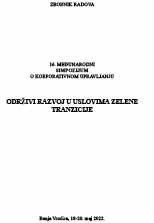INSTITUCIONALNI RAZVOJ KAO USLOV EKONOMSKOG RAZVOJA ZAPADNOG BALKANA
INSTITUTIONAL DEVELOPMENT AS A CONDITION FOR ECONOMIC DEVELOPMENT OF THE WESTERN BALKANS
Author(s): Dejan Šoškić
Subject(s): Economy, Economic development, Socio-Economic Research
Published by: Finrar d.o.o Banja Luka
Keywords: Western Balkans; institutional development; economic policy; regional economic growth;
Summary/Abstract: The economies of the Western Balkans have gone through two phases of development in the last two decades. In the first phase, before the global economic crisis, growth was mainly based on the inflow of capital from abroad and the growth of consumption. Trade and current account deficits were maintained at a relatively high level, and economic growth gravitated to the so-called non-tradable part of gross domestic product. Moderate economic development prevailed. Institutional and structural reforms, unfortunately, were largely left without sufficient depth in that period. After the financial crisis, the reform processes in some countries have mostly slowed down, and institutional reforms have in some places not only stopped but also retreated. The fundamental problems of the Western Balkan economies have become fully visible: human capital (quality of education and labor force) and institutional weaknesses maintain low productivity and competitiveness of economies. Therefore, it is not surprising that relatively low rates of economic growth are maintained and that there is no convergence with the countries of Central and Eastern Europe, as well as with the surrounding countries that are members of the EU. The stalemate in institutional reforms and EU integration of the Region does not enable the acceleration of economic growth in the Western Balkans. This paper aims to point out the importance of institutional reforms and the development of economic institutions as necessary preconditions for accelerating EU integration and the overall economic development of the Western Balkans.
Book: 16. MEĐUNARODNI SIMPOZIJUM O KORPORATIVNOM UPRAVLJANJU
- Page Range: 83-96
- Page Count: 14
- Publication Year: 2022
- Language: Serbian
- Content File-PDF

